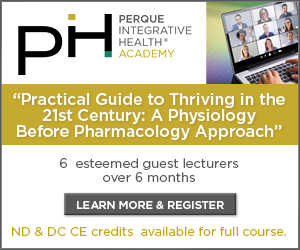In recent years, genetic testing has moved out of academic medical centers and into the consumer marketplace. For a relatively small price, people can now get their full genomes read, or purchase sophisticated risk assessments for everything from Alzheimer’s to cancer. But people who do so are often at a loss about how to respond to the test results.
According to Deanna Minich, PhD, this opens major opportunities for holistically-minded clinicians.
“We have all these new tests now. We have a tremendous amount of potentially useful genetic information available at our fingertips. How do we translate that into meaningful practice?” Dr. Minich, education director at the newly formed Personalized Lifestyle Medicine Institute, believes this is one of the most important questions facing medical professionals.
Companies like 23andMe, WellnessFX, and others have taken sophisticated genetic testing and advanced risk assessment directly into the consumer marketplace. For as little as $99 people can now get their genomes done, and learn a lot about their predispositions for a host of different disorders.
Yet, for the most part, the public is not yet taking advantage of these possibilities—technological advances were considered utter science fiction a couple of generations ago.
 “I just gave a lecture to people with advanced stage cancer. I asked how many have had their genetics done? None! I was really surprised,” said Dr. Minich. “These are people with serious diseases strongly influenced by genetics, and they didn’t have this easily obtainable information that could be beneficial.”
“I just gave a lecture to people with advanced stage cancer. I asked how many have had their genetics done? None! I was really surprised,” said Dr. Minich. “These are people with serious diseases strongly influenced by genetics, and they didn’t have this easily obtainable information that could be beneficial.”
Consumers who have waded into the waters of genomic testing often find it opens more questions—and worries—than it answers. There are few clinicians out there that can help people make sense of this kind of information.
In short, the technology for a highly individualized, rationally guided approach to disease prevention and treatment is here, and waiting to be translated into new modes of practice.
Taking it Personally
PLMI, drawing heavily on the work of Jeff Bland, PhD, and other pioneers in functional medicine, hopes to facilitate that translation. A non-profit educational organization, PLMI seeks to develop “virtual and in-person networks of collaboration between researchers, clinicians, patients, policy makers, and consumer advocates to bring personalized lifestyle medicine into greater visibility.”
With its clever tagline, “We take your health personally,” PLMI’s new website is definitely consumer-friendly, while maintaining the level of science clinicians have come to expect from the thought-leaders in functional medicine.
A core PLMI goal is to empower both clinicians and their patients through a deeper understanding of how genetic expression—and therefore disease-risk—is modulated by nutrition, environmental influences, and social factors.
What exactly is “personalized lifestyle medicine?”
According to PLMI, it’s an approach to clinical care “in which an individual’s health metrics from point-of-care diagnostics are used to develop lifestyle medicine-oriented therapeutic strategies for improving individual health outcomes in managing chronic disease.” This includes identification of genetic variants through lab tests and/or functional biomarkers, but it moves way beyond the “genetics is destiny” mindset of classical genetics.
Rather, genomic information should be used to guide patient-specific prescriptions for diet, exercise, stress, and environment. “Personalized lifestyle medicine can provide solutions to chronic health problems by harnessing innovative and evolving technologies based on recent discoveries in genomics, epigenetics, systems biology, life and behavioral sciences,” Dr. Minich says.
Opportunities on the Horizon
She believes there are tremendous opportunities for holistically-minded clinicians interested in helping people get the information they need, and then helping them figure out what they need to do once they have the information.
She’ll explore those opportunities in her presentation at Holistic Primary Care’s upcoming Heal Thy Practice 2013 conference in Long Beach, CA.
“We want to help clinicians figure out how to take all these innovative tests and mobile phone apps and point-of-care options, and build them into a comprehensive approach to practice.”
END








